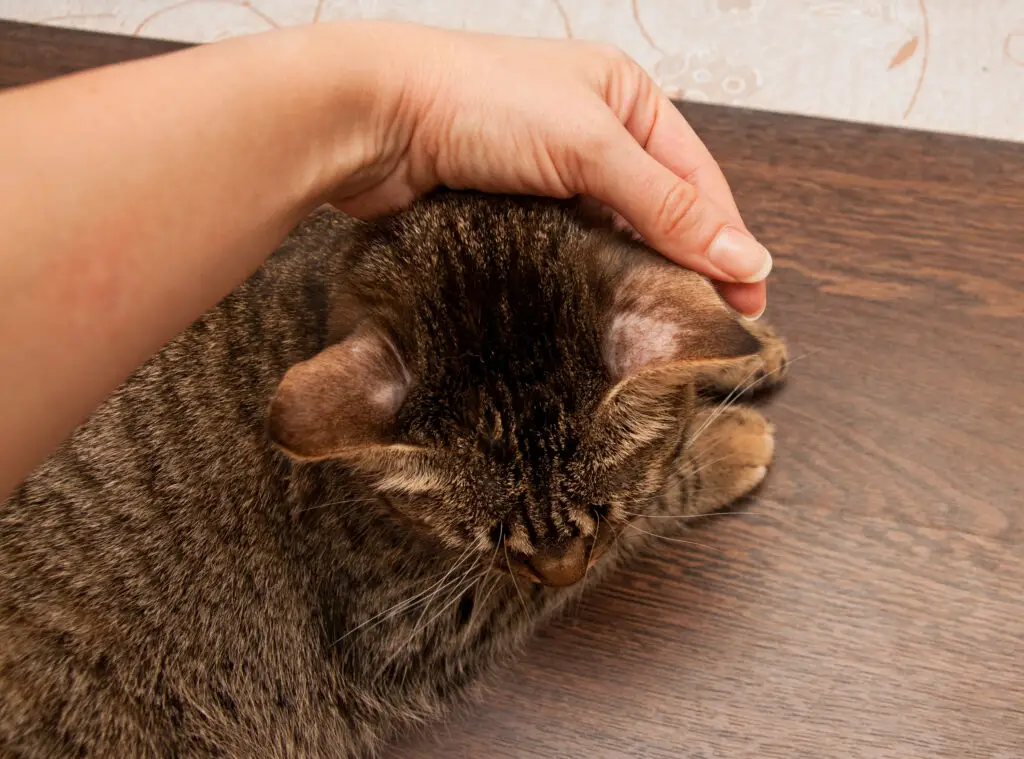Just like people, cats can experience hair loss. And while it may just be the result of old age or an unseen accident, it can also be a symptom of something more serious. Fortunately, it’s rather easy to know whether it’s time for a visit to the vet when a bald spot appears. If you find a single tiny patch of fur missing and there is no sign of blood, pus or irritation, it may just be that your cat scratched too hard or rubbed against a rough surface as we know they love to do. Keep an eye on the patch; if you don’t see hair growing back within a week, the patch changes in size or appearance, your cat looks to be irritated by it or you start to see more bald patches showing up, you’ll know it’s time to visit the vet. We consulted PetCareRx’s vet verified information to bring you five reasons your cat may experience hair loss. Read on to learn more!
HAIR LOSS CULPRIT #1: Fleas
Some cats are allergic to the saliva left behind by flea bites (flea allergy dermatitis). While a flea-ridden cat will exhibit the typical symptoms of extreme discomfort and excessive itching and grooming, a cat who is allergic to their unwelcome friends will also experience patchy hair loss exposing raw, irritated skin, particularly on the neck and face. It is important to note that this allergic reaction can occur up to two weeks after all the fleas are gone. WebMD Pets says, “Your pet’s veterinarian will recommend a topical, oral, or injected medication to ease your pet’s itching and inflammation.” They also recommend giving your cat year-round treatment with flea prevention medication to stop the reaction from occurring in the future, but you shouldn’t stop there. It is equally important to treat your home for fleas and eggs by cleaning the carpeting, bedding, furniture, etc.
HAIR LOSS CULPRIT #2: Environmental or Food Allergies
Your cat may be losing hair due to environmental or food allergies as well. In fact, PetCareRx says it is the leading cause of hair loss, and it will present itself as irritated patches of exposed skin. The most accurate way to figure out your cat’s allergy is to have your vet run tests and recommend solutions, but you can also try changing their diet or removing things from their environment that could be the cause. Sometimes gluten and grains can cause allergies – as can certain proteins. It’s essential to have your cat examined by your vet in order to find the correct culprit. If food allergies are the problem, there are plenty of specialty foods like limited ingredient formulas on the market to help your kitty get better!
HAIR LOSS CULPRIT #3: Ringworm
Ringworm is a fungal infection that can cause hair loss. If your cat has ringworm it is imperative that you take care of it immediately as ringworm is very contagious to other cats and humans. If infected with ringworm, older cats’ hair will become brittle and break off in patches, while kittens will get “reddish areas on the face, ears and paw pads, sometimes accompanied by a white or gray crust.” If your cat is showing these signs of ringworm, take her straight to the vet who will confirm whether ringworm is the correct diagnosis and, if so, prescribe the proper treatment.

Ringworm in cat. Bald spots at ears, skin problem and fur fall out. Diagnostics at the veterinary clinic
HAIR LOSS CULPRIT #4: Hyperthyroidism
Hyperthyroidism is a glandular disorder caused by an excess or shortage of thyroid hormone. Hair loss is just one of many symptoms, so do not panic at the first sight of it. The hair loss will typically present itself by becoming brittle and thin, losing its natural sheen and shedding in excess when you brush your cat. If you are concerned that your cat may have hyperthyroidism, head straight to the vet where they can run bloodwork to know for sure.
HAIR LOSS CULPRIT #5: Psychogenic Dermatitis
A cat suffering from psychogenic dermatitis will lick itself compulsively to the point of balding. The good news is that this is not a disorder that can become fatal or cause any serious health risks, but you should still consider it a cause for concern as it may be a sign your cat is stressed, or it could simply be the result of a bored kitty. If boredom is the case, consider it a great reason to engage your cat and play with him every day. If stress is the issue, you’ll need to do some thinking. Did someone recently move in or out of your home, or have you and your cat moved homes? Have you rearranged furniture? Have you brought a new cat or other animal into the house? Has your daily routine changed? As you can see, a particularly sensitive cat can become stressed by a multitude of things, and they are not always easily remedied.
If you are having trouble relieving your kitty’s stress, consult your vet about the possibility of behavioral therapy or anxiety medication in extreme cases. As always, you should contact your veterinarian promptly to get a proper diagnosis and help your kitty heal.
About the Author
Dana Mack is a freelance writer and copy editor living in Oregon. She’s a graduate of Columbia College Chicago, where she studied multimedia journalism. Dana enjoys arts & culture and outdoor/recreation writing.
This post contains affiliate links. We only recommend products we love and companies we support through our own patronage. When you click on one of our links, we may get compensated a small amount for sharing these products and discounts with you. As always – we appreciate your support!
